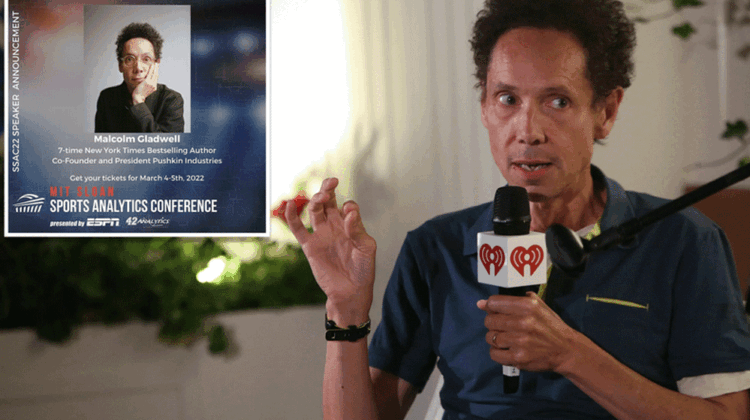
[Order Michael Finch’s new book, A Time to Stand: HERE. Prof. Jason Hill calls it “an aesthetic and political tour de force.”]
On a recent episode of a podcast called “The Real Science of Sport,” the writer Malcolm Gladwell admitted that on a 2022 panel at MIT, he’d expressed support for the practice of allowing “trans women” to compete in women’s sports when in fact he didn’t really support it at all. In fact he believed the exact opposite. Why, then, had he dissembled? Because, he said, he was “cowed.”
In other words, he was cowardly. He was fearful of bucking the elite media consensus on this issue. He was worried that his position as a golden boy of the establishment left would be damaged. Now, three years later – when a growing number of prominent men and women, notably J.K. Rowling, have dared to buck the elite media consensus on this issue, and when transgender ideology has finally been put on the defensive by both the Trump administration and the British Supreme Court – the power of trans activism is palpably on the wane (as Gladwell himself put it on the podcast, the “time of peak trans ideology is over”), and he now feels that it’s safe to acknowledge his real views on the topic.
Why does any of this matter? Well, let’s start with this. Gladwell is widely treated as an intellectual giant, a dazzling social analyst, a genius who can convey profound insights in entertaining prose aimed at the common reader. He is a jewel in the crown of the New Yorker, to which he has contributed for many years. His books, such as Outliers and The Tipping Point, have been massive bestsellers and continue to fill the shelves of airport bookstores. I’ve dipped into them from time to time (mostly while waiting for flights at the aforementioned airports) and haven’t been particularly impressed. Now this colossus admits that he’s capable of lying about his real opinions because he fears what it might do to his career.
I’m not entirely surprised by this admission, having seen Gladwell in action at the 2022 Munk Debate, in which he and New York Times fluffhead Michelle Goldberg debated the razor-sharp, fearless, and highly principled Douglas Murray and Matt Taibbi. The question under debate was whether the mainstream media can be trusted. Gladwell and Goldberg, of course, said yes. Both did a spectacularly lame job of making their argument. But I was particularly underwhelmed by the mediocrity of Gladwell, this alleged intellectual superstar.
And not just by his mediocrity. He was obnoxious, dishonest, dissembling. When the mass media’s deep-sixing of the Hunter Biden laptop was brought up, he sneeringly mocked the laptop’s importance. When Taibbi argued that the mainstream media were more reliable in the 1950s, Gladwell began accusing him of racist nostalgia for an era of white supremacy.
As noted, I haven’t read any of Gladwell’s books all the way through, but Murray apparently has. One of them, entitled David and Goliath, is about underdogs through the ages who’ve ended up on top. At the Munk Debate, after Gladwell extolled the supposedly rigorous fact-checking employed by mainstream media, Murray had a quick comeback. In David and Goliath, he said, “the chapter on Northern Ireland is more filled with inaccuracies than any other chapter in a non-fiction book I have read.”
Gladwell’s about-face on trans athletes wasn’t lost on Murray. Writing in the New York Post on September 4, he pointed out that thanks to Gladwell’s reliable habit of serving up “received opinions,” he’d won “lucrative positions at liberal publications” and racked up remarkable book sales. “His schick,” wrote Murray, is that he says “banal things in ways that appear spicy and new.” Yes, that’s my impression too.
Yet now, Murray continued, Gladwell had “admitted that he is a coward” and had even acknowledged that his remarks at MIT were “dishonest.” Murray’s response: he wasn’t “remotely surprised that Gladwell would approach a debate with dishonesty. His performances are generally filled with group-think and laced with condescension toward anyone he finds disagreeing with him….in all the decades I have debated my own views in public, I don’t think I’ve often come across someone so willing and indeed eager to debate in bad faith.”
And here’s why all this matters. We’re talking about a guy whom the left-wing media have celebrated for years as some kind of brilliant, gutsy cutting-edge thinker. These are the same media, needless to say, that have raked people like the former University of Kentucky swimmer Riley Gaines over the coals for daring to stand up against the inclusion of “trans women” in female sports competitions. Riley Gaines, mind you, is less than half Gladwell’s age (she’s 25, he’s 62), but she’s nonetheless spent the last several years boldly challenging the elite consensus on this issue – the consensus that Gladwell was terrified to buck. A torrent of media smears has failed to silence her. This remarkable young woman’s courage should shame Gladwell. But I suspect he’s incapable of shame.
Riley Gaines may be what Gladwell would call an outlier, but fortunately she’s not unique. I live in a small Norwegian town where just the other day the local newspaper ran an opinion piece by two schoolboys who were previously unknown to me. Damian Bergom is 17; Emil Berntsen is 15. Their article, published in the midst of a national election campaign, was nothing less than breathtaking in its fearlessness. “A large majority of the teachers” at their school, they charged, freely push their own political opinions, which are uniformly socialist, and present them to their classes as definitive and incontestable, all the while attacking any of their students who dare to express conservative views.
These teachers tell their classes that “if you vote for the Progress Party” – the one party that strongly opposes mass Muslim immigration – “you’re only thinking about yourself.” When they hear kids express what they consider to be right-wing views, they roll their eyes. They “create the impression that those who vote for non-socialist parties are idiots.” Indeed, “if you aren’t a socialist,” you’re pretty much “screamed at.” The result is that boys and girls who don’t share their teachers’ left-wing views are scared to speak their minds in the classroom lest their teachers write them off as “dumb” or “extremists.”
How, ask Bergom and Berntsen, can this be allowed? What ever happened to the idea that “all ideologies and parties should be treated equally in education”? How is it that classrooms have become “polling stations for the Labor Party, the Socialist Left, and the Reds?”
Well, that’s an easy question to answer. Norway’s public sector, including its schools and universities, has long been a wholly owned subsidiary of the Labor Party. That secondary-school classrooms are incubators of progressivism is old news to me. But then – strange though it seems – I’ve lived in Norway longer than these two boys who were born here.
All of which makes it extraordinarily impressive that these two valiant lads in this obscure town worked up the nerve to write a piece for the local daily that’s braver than anything Malcolm Gladwell ever put on paper. Three cheers for them. And a thousand jeers for the pusillanimous Gladwell, who, far from being a pathbreaking thinker, has proven himself, as J.K. Rowling commented in a September 5 tweet, to be nothing more than a “weathervane” – a lily-livered, yellow-bellied guide to the consensus views of the day.
















